It's common to see travel commercials from different Asian countries on CNN Asia. Usually they feature Thailand, Hong Kong and Malaysia, but in the last three months there has been a 30-second ad packed with images of Chinese temples, mountains, items of Chinese cuisine and elements of Aboriginal culture, accompanied by pounding drums. At the end, a voiceover says: "Naruwan! Welcome to Taiwan!"
William Trainor, an English teacher living in Taipei, said he was surprised to see these images about Taiwan on CNN, but had no idea what Naruwan meant. "I thought it was the name of another island." It wasn't until later his roommates told him it was Aboriginal for "Hello."
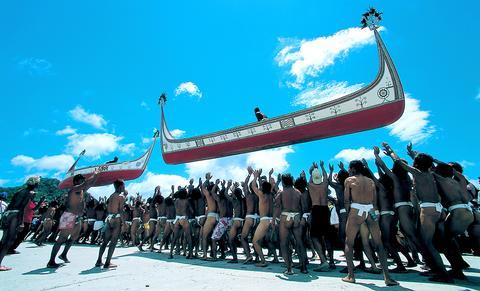
PHOTO COURTESY OF TOURISM BUREAU
"Naruwan" is the government's slogan for Visit Taiwan Year (2004台灣觀光年). Apart from CNN Asia commercial, two other ads were broadcast on CNN Europe and CNN US, said Su Chern-tyan (蘇成田), the director general of the Tourism Bureau of Ministry of Transportation and Communications (觀光局). These latter ads pointed out where Taiwan is and the other extolled the beauty of the island.
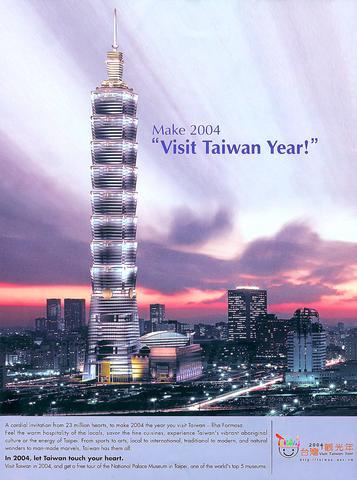
"It's true that we have seldom promoted Taiwan on international channels in the past. Now, we want to let the world know that Taiwan is not just an industrial island making computer chips, or a place facing military threats from China. We want to change people's perceptions about Taiwan, where you can do a lot traveling," Su said.
As for "Naruwan," Su said the slogan was chosen by an Internet vote of some 150,000 votes, just beating out: "Nie Hao Ma?" (How are you?).
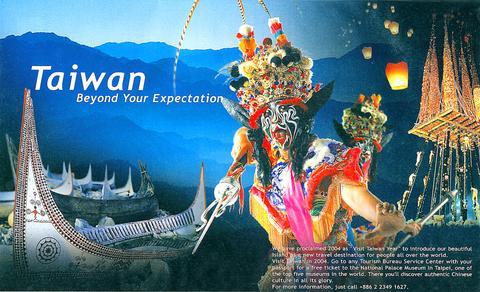
PHOTO COURTESY OF TOURISM BUREAU
"We hope the slogan will become like `Aloha' in Hawaii, becoming a word that Taiwanese people welcome foreigners with," he said, adding that although Taiwanese people don't often say Naruwan, the word would now be used frequently at tourist spots and performance venues.
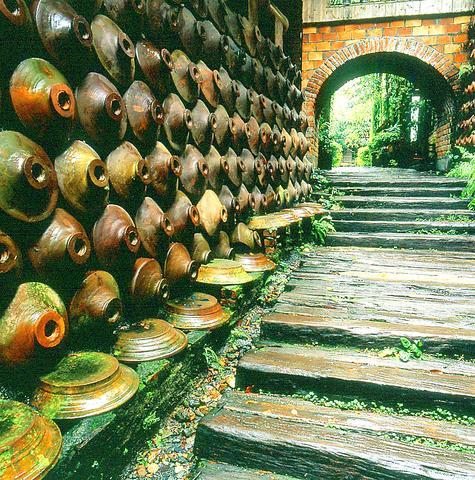
Other efforts to promote the 2004 Visit Taiwan Year include two ads in Time magazine. One features the Eight Generals, a religious spectacle, and the other features the tallest office building in the world, the Taipei 101 building. Last year, the Tourism Bureau, with Taiwan's China Motors (中華汽車), sponsored a three-episode program introducing Taroko Gorge in Hualien County to the world. The bureau also sponsored the Asian Challenge program on National Geographic Channel and the Global Trekker program on Knowledge Channel.
These endorsements for 2004 Visit Taiwan Year comprise part of the funding for the overarching Challenge 2008 National Development Project, which Premier Yu Hsyi-kun announced at the end of 2002. The Tourist Doubling Project is a key element in this plan and intends that tourist figures will increase in 2008 to 5 million a year. With the ongoing changes to Taiwan's industrial structure -- in which traditional manufacturing businesses are shifting to China and other Asian countries -- the service industries are becoming increasingly important.
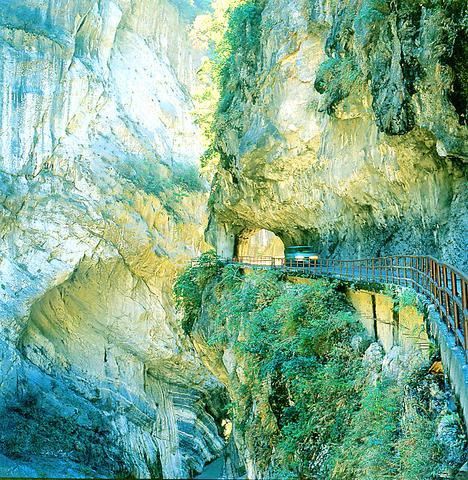
"Tourism has never been big in this country. Tourism bureau statistics show that in 2002, tourism was less than 4 percent of the country's GDP, a small figure compared with 40 percent in Thailand," said Wayne Liu (劉喜臨), an official from the bureau.
To achieve this, the budget of the Tourism Bureau has been doubled since 2002, with a large proportion of the funding, some NT$200 million annually, going toward international promotion.
"In the past three years, the government has become more active at travel fairs in overseas countries," said Tseng Chyan-shiun (曾前訓), secretary general of the Taiwan Visitor Association (台灣觀光協會).
Tseng said in the past Taiwan's stand at international travel fairs had been small and catered to few visitors, with just a few brochures introducing Taiwan, with a "chef" offering Chinese food. This year, the bureau is taking some 50 travel businesses and travel agencies to 11 international travel fairs, including Berlin, Malaysia, Korea and London. Apart from offering Chinese food, there will be Aboriginal dancing and puppet performances to attract business to the Taiwan stand.
"We are confident of attracting 5 million [tourists] by 2008. For the 2004 Visit Taiwan Year, we aim to attract 3.2 million tourists to Taiwan," said Su of the tourism bureau.
Local travel agencies and foreign travelers to Taiwan, however, were not so optimistic about the situation. "Taiwan does not seem to have a whole lot to offer, or at least I haven't been informed of those places to visit in English," said Trainor.
"Language is a major problem. Although there are many Taiwanese who speak English, they don't much at tourist spots. There is little information in English," said Craig Berman, a tourist from the US. He said most of his travel information was from the book Lonely Planet and his Taiwanese friends.
Richard Wu (吳繼文), a director of Golden Foundation Tours Corp (金界旅行社) agreed. "In our experience -- arranging tours with American or European travelers -- Taiwan is not really a friendly place for backpackers. There are more than two kinds of spellings on street signs. English information is not enough. And things are not especially cheap here compared to other Asian countries.
Paul Hsu (許永裕), vice president from South East Travels (東南旅行社) -- Taiwan's largest travel agency, dealing with the Japanese market -- said there were other disadvantages to traveling in Taiwan. "For many Japanese tourists the air fare and hotel prices are too expensive compared with Hong Kong, Singapore and Thailand." He said it cost ?78,000 (NT$24,500) to travel to Taiwan from Japan, while going to Hong Kong and Singapore cost under half that amount. Airfares to Shanghai are around three-quarters cheaper. "We feel that many of our Japanese guests are now drawn to the China market," Hsu said.
Both Wu and Hsu said there were attractions in Taiwan, but these needed to be marketed better and the concept of a distinct identity from China had to be made. "We have been trying to promote the concept of small and beautiful, compared with the big mountains and water attractions of China," Hsu said.
"We are now promoting package trips. After seeing China, you can come and see a very different Chinese society, where it is democratic and modern," Wu said of his marketing efforts to Europeans and North Americans. "Taiwan is a small, cultural melting pot, where Aboriginal culture has mixed with Han culture for 400 years. ... And we have so many foreign influences from both Japan and the US. This kind of hybrid of Chinese culture is something we should market and not just superficial images of Aboriginals or Chinese food."
The government seems to be in agreement with this line of thinking and for the 2004 Visit Taiwan Year it's promoting a range of tourism activities, including religious gatherings such as the Matsu Pilgrimage, the Yenshui rocket festival and Chinese ghost festivals. Taiwan's temples and religious ceremonies are unique and these styles and rituals are not seen in China, said Su from the tourism board.
"The heritages of those local religions have been passed down by generations. Whereas in China you may see beautiful temples, there may be no incense and the gods are not worshipped anymore and the religious activities inside the temples are long-gone. As far as Buddhism is concerned, Taiwan is one of the few places in the world where one can find historical temples that offer English instruction in meditation," Su said.
"Major temples, such as Buddhist Light (佛光山), offer a whole course of Buddhist meditation in English, including reading Buddhist Scripture and kungfu. ... Those who are interested in oriental religions should really come to Taiwan."

June 2 to June 8 Taiwan’s woodcutters believe that if they see even one speck of red in their cooked rice, no matter how small, an accident is going to happen. Peng Chin-tian (彭錦田) swears that this has proven to be true at every stop during his decades-long career in the logging industry. Along with mining, timber harvesting was once considered the most dangerous profession in Taiwan. Not only were mishaps common during all stages of processing, it was difficult to transport the injured to get medical treatment. Many died during the arduous journey. Peng recounts some of his accidents in

“Why does Taiwan identity decline?”a group of researchers lead by University of Nevada political scientist Austin Wang (王宏恩) asked in a recent paper. After all, it is not difficult to explain the rise in Taiwanese identity after the early 1990s. But no model predicted its decline during the 2016-2018 period, they say. After testing various alternative explanations, Wang et al argue that the fall-off in Taiwanese identity during that period is related to voter hedging based on the performance of the Democratic Progressive Party (DPP). Since the DPP is perceived as the guardian of Taiwan identity, when it performs well,

The Taiwan People’s Party (TPP) on May 18 held a rally in Taichung to mark the anniversary of President William Lai’s (賴清德) inauguration on May 20. The title of the rally could be loosely translated to “May 18 recall fraudulent goods” (518退貨ㄌㄨㄚˋ!). Unlike in English, where the terms are the same, “recall” (退貨) in this context refers to product recalls due to damaged, defective or fraudulent merchandise, not the political recalls (罷免) currently dominating the headlines. I attended the rally to determine if the impression was correct that the TPP under party Chairman Huang Kuo-Chang (黃國昌) had little of a

At Computex 2025, Nvidia CEO Jensen Huang (黃仁勳) urged the government to subsidize AI. “All schools in Taiwan must integrate AI into their curricula,” he declared. A few months earlier, he said, “If I were a student today, I’d immediately start using tools like ChatGPT, Gemini Pro and Grok to learn, write and accelerate my thinking.” Huang sees the AI-bullet train leaving the station. And as one of its drivers, he’s worried about youth not getting on board — bad for their careers, and bad for his workforce. As a semiconductor supply-chain powerhouse and AI hub wannabe, Taiwan is seeing